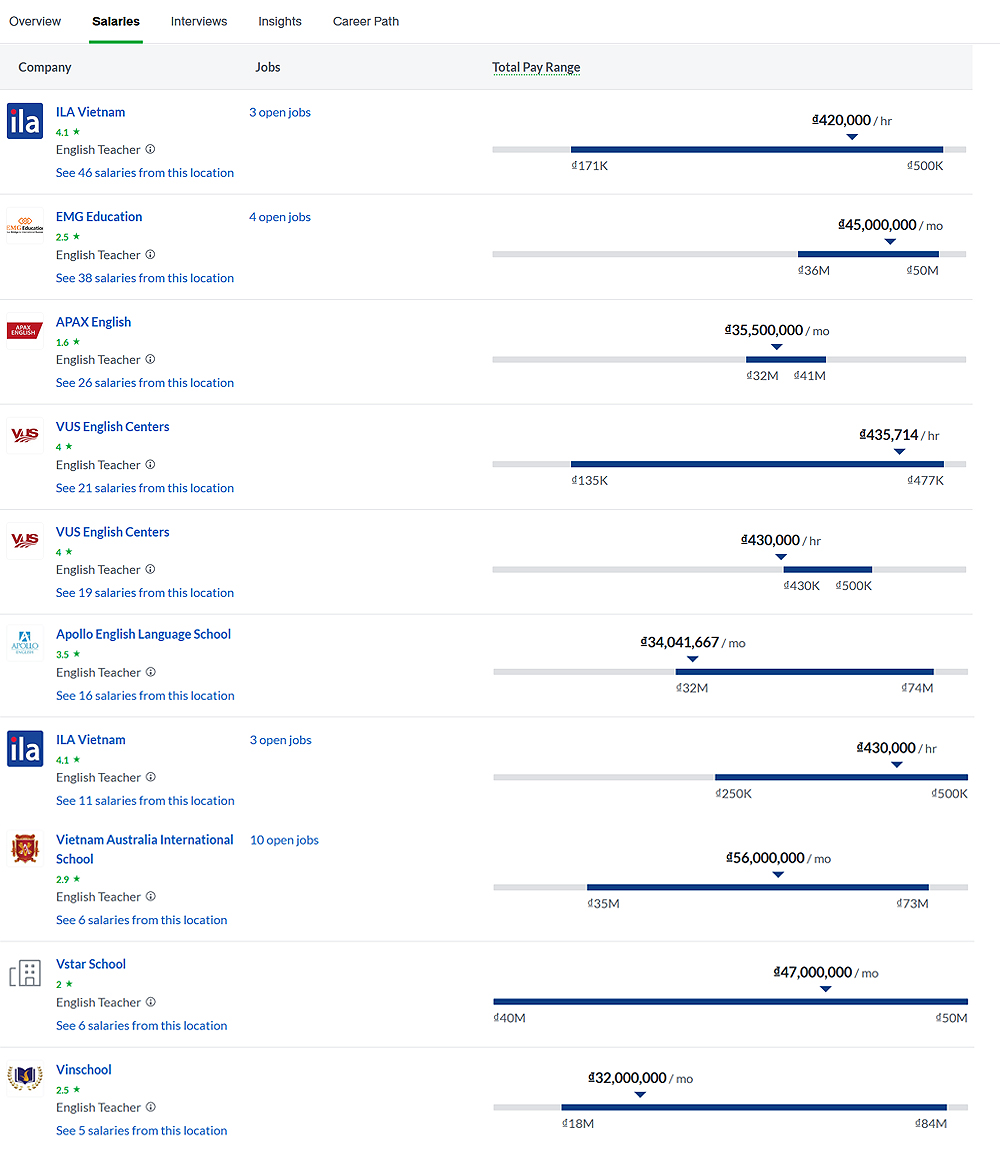Did you know that, when it comes to ESL teaching, Vietnam offers one of the most competitive salary packages in Southeast Asia? Yes it does !
While some teachers prefer places like South Korea and Japan, few might very slot88 MVP189 well find their golden goose right in the heart of Vietnam. In cities like Ho Chi Minh and Hanoi, the ESL wave isn’t just about imparting language skills; it’s an experience flavored with cultural richness and a decent salary for English teachers.
Over the past decade, Vietnam has truly emerged out as the most sought after destination for trade, tourism, and culture. Nestled within its vibrant streets and bustling cities, there’s a growing demand for the English language, which isn’t merely a trend but a reflection of its global aspirations.
While the most known destinations like Ho Chi Minh City (HCMC) and Hanoi draw the world’s attention with their fascinating mix of old-world charm and modern-day hustle, lesser-known provinces are also making their mark. From Cao Bằng in the North to Cà Mau in the South, these areas offer unique experiences to teachers. It’s here that the heart of Vietnam’s English education truly beats.
But let’s talk brass tacks. What does this mean for an English teacher’s wallet?
Beyond the enriching cultural encounters and the joy of teaching, there’s a pragmatic side to this journey. Salary, benefits, contractual perks – these elements are crucial for any aspiring teacher weighing their options to teach English in Vietnam.
So, let’s uncover the salaries and benefits for an English teacher in Vietnam; and also find out how much does a teacher earn.
What is the Average Salary for an English Teacher in Vietnam?
The average monthly salary for English teachers in Vietnam ranges between US$1,000 to US$2,300, that is approximately 25 million VND to 55 million VND – depending upon where they teach.
“On average, a TEFL-certified English teacher can expect an income boost of around 15-20% compared to their non-certified counterparts.”

(Source: Glassdoor Salaries).
These figures, while enlightening, are mere skeletons.
The flesh? It’s in the benefits: housing stipends, insurance, flight reimbursements.
… more on this later.
With the cost of living in Vietnam being relatively low, you’re not just earning; you’re earning well. It’s not just about surviving; it’s about thriving. And that’s what we all dream, isn’t it?
Picture sipping on some delightful Cà phê sữa đá (iced coffee with milk) without the dread of a dwindling bank account.
Refreshing, right?
So, if you’re dreaming of teaching English, Vietnam might just be the place where your dreams meet a delightful reality. And while money isn’t everything, in the world of ESL in Vietnam, it’s a pretty attractive slice of the Bánh xèo (sizzling pancake)!
Now let’s look at the salary insight based on different types of teaching setup/institutions across Vietnam.
1. Salary for Teachers in Public Schools
Public schools offer a consistent income, with teachers earning an average of US$1,000 to US$1,500 per month. However, the real gem often lies in the intangible rewards: a deep immersion in local culture, holidays aligned with Vietnamese festivals, and a sense of being part of the community.
2. Salary for Teachers in Private Language Centers
Private centers can be lucrative. Teachers often earn between US$1,500 to US$2,300 per month. Plus, there’s the added flexibility of evening or weekend classes, allowing for potential side gigs or exploratory travels.
3. Salary for Teachers in International Schools
The paycheck reflects prestige. Teachers can anticipate a salary ranging from US$2,000 to US$4,000 per month, accompanied by substantial benefits like housing allowances, health insurance, and even flight reimbursements.
| School Type | Salary Range | Benefits |
|---|---|---|
| Public Schools | US$1,000 to US$1,500 per month | – Consistent income – Immersion in local culture – Holidays aligned with Vietnamese festivals |
| Private Language Centers | US$1,500 to US$2,300 per month | – Potential for higher earning – Flexibility in scheduling (evening/weekend classes) – Opportunities for side gigs and travels |
| International Schools | US$2,000 to US$4,000 per month | – Highest salary range – Additional benefits such as housing allowance, health insurance, and flight reimbursements |
In summary, teaching in Vietnam offers diverse salary ranges that correlate with the setup of educational institutions; public, private, and international schools each have their own salary scales. Beyond the remuneration, teachers often have the advantage of exploring the rich Vietnamese culture and picturesque locales, facilitating a fulfilling experience that blends your career growth with travel opportunities.
The Role of Qualifications in Salary Differentials
“Knowledge is power” – Sir Francis Bacon
In the world of English teaching in Vietnam, this age-old saying translates quite literally into financial power. The connection between qualifications and salary isn’t just a typical HR metric; it’s a sign of the nation’s deep respect for education and expertise.
TEFL, TESOL, CELTA and Their Impacts
The acronyms TEFL (Teaching English as a Foreign Language), TESOL (Teaching English to Speakers of Other Languages), and CELTA (Certificate in English Language Teaching to Adults) are not just letters on a resume; they’re golden tickets to enhanced earning opportunities in Vietnam. Holding one of these certifications doesn’t just signify a teacher’s commitment to the craft but also their prowess.
Here’s a quick peek into how these qualifications can impact an English teacher’s monthly salary:
| Qualification | Additional Salary Percentage |
|---|---|
| TEFL | +15% |
| TESOL | +18% |
| CELTA | +25% |
These percentages, of course, vary based on individual institutions, but they offer a bird’s-eye view of the financial perks these certifications bring.
Bachelor’s Degree vs. Master’s Degree
Beyond these specialized certifications, there’s the age-old contest: Bachelor’s vs. Master’s. A Master’s degree, especially in fields related to language or education, often gives teachers an edge not only in securing premier positions but also in commanding higher salaries. In Vietnam, the reverence for higher education isn’t just cultural; it’s tangible, and it reflects in the paychecks.
To crystallize this, the data given below provides an interesting perspective:
| Degree Held | Average Salary Boost |
|---|---|
| Bachelor’s | Base Salary |
| Master’s | +20% to Base Salary |
Now, while qualifications play a key role in deciding the paycheck, it is equally important to remember that they are just one part of a bigger picture.
Experience and its Weightage
“Experience is the teacher of all things,” – Julius Caesar remarked centuries ago, and the world of English teaching in Vietnam stands testament to this timeless wisdom.
A seasoned hand brings more to the classroom than just grammatical rules or pronunciation drills. They weave stories, manage nuances, and craft lessons that stick.
And, rightfully, Vietnam recognizes and rewards this intricate asset – that is; “Experience”.
In Vietnam, as in many parts of the world, experience isn’t just a chronological measure of years spent in classrooms. It’s a testament to a teacher’s evolving pedagogical strategies, their ability to adapt to different learning environments, and their capacity to inspire students of varying aptitudes.
While fresh faces in the field often find lucrative opportunities to start their journey, the scales tip favorably as one gathers experience. This isn’t just reflected in the monetary compensation but also in the opportunities for professional growth that come with time and experience.
For instance, English teachers in Vietnam with over five years of experience can expect an average salary hike of around 20-30% compared to their less experienced counterparts. These figures offer a glimpse into how highly valued experience is in this educational market.
But remember, every classroom, every interaction, every lightbulb moment is another step in this incredible journey. Vietnam’s teaching landscape not only appreciates these journeys but also remunerates them accordingly.
Moreover, the benefits of experience aren’t confined to the paycheck alone. Experienced educators often enjoy greater bargaining power when negotiating contractual terms, be it for vacation time, housing benefits, or professional development opportunities. Therefore, each year spent honing this craft can indeed open new doors of opportunity in this vibrant land.
So, is the pay rewarding? Absolutely! But just as importantly, is the journey rewarding? Well, the countless educators who have found a home away from home in Vietnam would undoubtedly answer with a resounding “yes.”
Cost of Living in Vietnam
Good news for those looking to teach English in Vietnam; living there won’t break the bank!
The typical cost of living for an English teacher would range from US$700 to US$1,000 monthly for a basic, budget-conscious lifestyle, and could increase to around US$1,000 to US$2,000 for a more comfortable, moderate lifestyle, which includes better housing and more leisure activities.
With that being said, you’ll definitely find places to stay and eat that are totally affordable, leaving you with enough cash to explore and enjoy everything the country has to offer. Picture enjoying delicious meals, experiencing vibrant cultures, and saving money at the same time – it’s no wonder Vietnam is a hotspot for young teachers from around the world.
Let’s take a look at the cost of living in Vietnam in detail.
- Affordable Accommodation: While accommodation is often provided or subsidized by your employers, renting an apartment independently is also remarkably affordable. For example, a modern studio apartment in a bustling city like Ho Chi Minh can be rented for as little as $300 per month, according to Numbeo.
- Budget-Friendly Eateries: Vietnam is a paradise for food lovers. Its bustling street markets and local eateries offer a feast for the senses without burning a hole in your pocket. A hearty, delicious meal at a local restaurant can cost less than $2, while a monthly grocery bill seldom exceeds $50.
- Public Transport and Commuting: Vietnam’s public transportation system is both comprehensive and budget-friendly. Monthly passes for public buses in major cities seldom exceed $10. For those preferring private transport, motorcycles – the most common vehicle in Vietnam – are an economical choice, with costs typically ranging from $200 to $300 for a decent second-hand bike.
- Leisure and Entertainment: When it comes to leisure and entertainment, there’s no shortage of affordable options in Vietnam. From exploring UNESCO World Heritage sites to indulging in affordable spa treatments or enjoying the bustling nightlife, the opportunities are endless and easy on the wallet.
- Healthcare: The healthcare system in Vietnam is generally of a good standard and more affordable than in many Western countries. Regular check-ups, dental services, and even prescription drugs come at a fraction of the cost one might expect back home.
The relatively low cost of living in Vietnam, coupled with a competitive English teaching salary, allows for a comfortable lifestyle while also offering the potential for savings. Whether you’re a food lover, an avid traveler, or a city-dweller, Vietnam provides a favorable financial landscape that compliments the rewarding journey of teaching English.
Comparing English Teaching Salaries: Vietnam vs. Other Asian Countries
Asia has long been an attractive hub for aspiring English teachers due to its high demand for ESL instructors and competitive compensation packages. However, Vietnam’s allure is not only its vibrant culture and welcoming locals but also its promising remuneration for English teachers.
How does Vietnam stack up against other popular ESL destinations in Asia, though? Let’s delve into a comparative study.
| Country | Salary (Range) | Cost of Living (Range) | Can You Save? | Affordability Index (out of 10) | Unique Attractions |
|---|---|---|---|---|---|
| Vietnam | $1,000 to $2,300 | Low to Moderate | Yes | 8 | Booming ESL market, warm teaching environment |
| China | $1,500 to $2,800 | Moderate | Depends | 6 | Lucrative ESL destination, major metropolitan cities |
| South Korea | $2,000 to $3,200 | Moderate to High | Yes | 4 | Long-standing ESL industry, fast-paced lifestyle |
| Japan | $1,700 to $4,000 | High | Very Little | 3 | High salaries but stringent requirements |
| Thailand | $800 to $1,200 | Low to Moderate | Very Little | 5 | Lower salaries but potential for experience |
(Note: The “Affordability Index” is a subjective score out of 10, with a higher score indicating more affordability. The score is derived from the cost of living and potential earnings.)
So, that leads to the most important question:
How Much Can English Teachers Save in Vietnam?
A crucial inquiry that prospective English teachers have before moving to a new country is about their potential earnings and savings. In Vietnam, the demand for English teachers is definitely high and competitive, giving rise to attractive packages for qualified teachers. Yet, what truly matters at the end of the day is the amount one can save after meeting all expenses. So, how much can an English teacher save in Vietnam? Let’s find out.
An English teacher’s qualifications and experience have a very significant impact on their earnings. Certified teachers holding a bachelor’s degree with a recognized TEFL, TESOL, or CELTA certificate can expect to earn between US$1,000 and US$2,300 per month. Their experience can further support (add up to) their monthly income.
Yet, understanding the saving potential requires a deeper look into the living costs in Vietnam. An individual can expect to incur a monthly expense of US$700 to US$1,000, which includes housing, transportation, food, and leisure activities. Urban areas like Hanoi and Ho Chi Minh City might slightly tip the scales on the higher end due to a more elevated cost of living.
Doing the math, it becomes apparent that a teacher can potentially save anywhere between US$300 and US$1,300 monthly. Further, the perks like housing allowances and medical insurance that many schools and language centers offer can significantly influence the savings.
Other Benefits for English Teachers in Vietnam
Below are some of the other potential benefits; which can vary significantly depending on the specific employer and the details of the job offer. It’s always recommended to discuss potential benefits in detail during the job negotiation process to understand exactly what is being offered.
1. Housing Allowance or Accommodation
A welcoming start in Vietnam: Stepping into Vietnam as an English teacher, one of the first things you’ll appreciate is the housing support many institutions offer. It’s not just about having a roof over your head — it’s about settling into a space you can call home without breaking the bank. This allowance or provided accommodation ensures that from day one, you can nestle into a comfortable spot that doesn’t eat too much into your earnings, paving the way for a stress-free start to your teaching journey in Vietnam.
2. Health Insurance
Your well-being prioritized: As an English teacher building a life in Vietnam, your health shouldn’t take a backseat. That’s why several schools and educational institutions take the initiative to offer health insurance. It is more than a safety net; it’s a testament to the fact that your new workplace values you not just as an educator, but as an individual who deserves the best care possible.
3. Flight Reimbursement
Smoothing your transition: Venturing from your home country to start a teaching job in Vietnam is an exciting leap, but it comes with its costs. Recognizing this, many schools are keen to ease your journey by reimbursing flight costs, either partly or in full, at the beginning or end of your contract. It’s their way of saying, “Welcome on board, we are here to support your transition.”
4. Paid Holidays
Time off to recharge: As you immerse yourself in the dynamic world of teaching English in Vietnam, you’ll find that periods to unwind are vital. Schools often underscore the importance of a balanced life by offering paid holidays, encouraging you to explore the picturesque landscapes of Vietnam or simply curl up with a good book at home, all while enjoying a sustained income.
5. Visa and Work Permit Assistance
Guiding your first steps: The bureaucratic steps to becoming an official English teacher in Vietnam might initially seem a bit daunting. Thankfully, a lot of institutions walk you through this process, helping secure the required visas and work permits. This assistance transforms a potentially stressful process into a guided, straightforward path, letting you focus more on your upcoming teaching adventure.
6. Professional Development Opportunities
Fostering your growth: Your journey as an English teacher in Vietnam is not just about what you bring to the table, but also what you can take away from this enriching experience. Numerous schools cultivate a nurturing environment with workshops and courses to fuel your professional growth. It’s about building a community where English teachers can learn, innovate, and evolve, fostering a fulfilling and fruitful career in Vietnam.
Conclusion:
Teaching English in Vietnam is more than just another job – it’s an invitation to experience a melting pot of rich traditions, tempting flavors, and warm-hearted locals. While competitive salaries might initially draw many teachers to its shores, it’s often the intangible rewards that become lifelong memories.
Throughout this article, the lens has been firmly on deciphering the tangible aspects of salaries and benefits for English teachers in Vietnam. But diving beneath the figures, it becomes evident that Vietnam is not merely a paycheck destination. The blend of a relatively low cost of living, coupled with the mesmerizing landscapes and traditions, sets Vietnam apart in the Asian ESL market.
The numbers are promising, yes. When compared to neighboring countries, Vietnam holds its own, often outshining others in the balance of earnings and expenditures. Yet, it’s the moments outside the classroom – the bustling marketplaces, serene paddy fields, and ancient temples – that often resonate deeply with educators.
For those on the brink of embarking on an ESL journey in Asia, Vietnam emerges not just as a financially sound choice but also as a destination that promises personal and professional enrichment.
This article was originally published in Sep-2023 and was last updated in Apr-2025.
Author: Celia Jenkins




